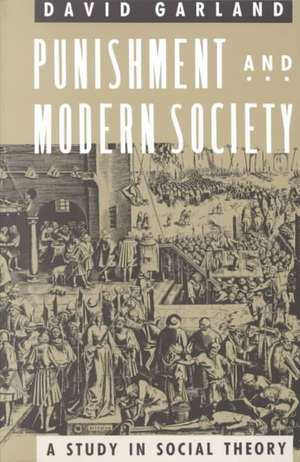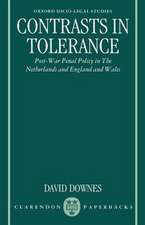Punishment and Modern Society: A Study in Social Theory: Studies in Crime and Justice
Autor David Garlanden Limba Engleză Paperback – 15 iun 1993
In this path-breaking book, David Garland argues that punishment is a complex social institution that affects both social relations and cultural meanings. Drawing on theorists from Durkheim to Foucault, he insightfully critiques the entire spectrum of social thought concerning punishment, and reworks it into a new interpretive synthesis.
"Punishment and Modern Society is an outstanding delineation of the sociology of punishment. At last the process that is surely the heart and soul of criminology, and perhaps of sociology as well—punishment—has been rescued from the fringes of these 'disciplines'. . . . This book is a first-class piece of scholarship."—Graeme Newman, Contemporary Sociology
"Garland's treatment of the theorists he draws upon is erudite, faithful and constructive. . . . Punishment and Modern Society is a magnificent example of working social theory."—John R. Sutton, American Journal of Sociology
"Punishment and Modern Society lifts contemporary penal issues from the mundane and narrow contours within which they are so often discussed and relocates them at the forefront of public policy. . . . This book will become a landmark study."—Andrew Rutherford, Legal Studies
"This is a superbly intelligent study. Its comprehensive coverage makes it a genuine review of the field. Its scholarship and incisiveness of judgment will make it a constant reference work for the initiated, and its concluding theoretical synthesis will make it a challenge and inspiration for those undertaking research and writing on the subject. As a state-of-the-art account it is unlikely to be bettered for many a year."—Rod Morgan, British Journal of Criminology
Winner of both the Outstanding Scholarship Award of the Crime and Delinquency Division of the Society for the Study of Social Problems and the Distinguished Scholar Award from the American Sociological Association's Crime, Law, and Deviance Section
"Punishment and Modern Society is an outstanding delineation of the sociology of punishment. At last the process that is surely the heart and soul of criminology, and perhaps of sociology as well—punishment—has been rescued from the fringes of these 'disciplines'. . . . This book is a first-class piece of scholarship."—Graeme Newman, Contemporary Sociology
"Garland's treatment of the theorists he draws upon is erudite, faithful and constructive. . . . Punishment and Modern Society is a magnificent example of working social theory."—John R. Sutton, American Journal of Sociology
"Punishment and Modern Society lifts contemporary penal issues from the mundane and narrow contours within which they are so often discussed and relocates them at the forefront of public policy. . . . This book will become a landmark study."—Andrew Rutherford, Legal Studies
"This is a superbly intelligent study. Its comprehensive coverage makes it a genuine review of the field. Its scholarship and incisiveness of judgment will make it a constant reference work for the initiated, and its concluding theoretical synthesis will make it a challenge and inspiration for those undertaking research and writing on the subject. As a state-of-the-art account it is unlikely to be bettered for many a year."—Rod Morgan, British Journal of Criminology
Winner of both the Outstanding Scholarship Award of the Crime and Delinquency Division of the Society for the Study of Social Problems and the Distinguished Scholar Award from the American Sociological Association's Crime, Law, and Deviance Section
| Toate formatele și edițiile | Preț | Express |
|---|---|---|
| Paperback (2) | 274.19 lei 6-8 săpt. | |
| University of Chicago Press – 15 iun 1993 | 274.19 lei 6-8 săpt. | |
| OUP OXFORD – 3 oct 1991 | 401.06 lei 31-37 zile | |
| Hardback (1) | 629.90 lei 31-37 zile | |
| OUP OXFORD – 5 sep 1990 | 629.90 lei 31-37 zile |
Preț: 274.19 lei
Nou
Puncte Express: 411
Preț estimativ în valută:
52.47€ • 56.98$ • 44.08£
52.47€ • 56.98$ • 44.08£
Carte tipărită la comandă
Livrare economică 22 aprilie-06 mai
Preluare comenzi: 021 569.72.76
Specificații
ISBN-13: 9780226283821
ISBN-10: 0226283828
Pagini: 320
Dimensiuni: 152 x 229 x 25 mm
Greutate: 0.55 kg
Ediția:1
Editura: University of Chicago Press
Colecția University of Chicago Press
Seria Studies in Crime and Justice
ISBN-10: 0226283828
Pagini: 320
Dimensiuni: 152 x 229 x 25 mm
Greutate: 0.55 kg
Ediția:1
Editura: University of Chicago Press
Colecția University of Chicago Press
Seria Studies in Crime and Justice
Cuprins
Introduction
1. The Sociology of Punishment and Punishment Today
2. Punishment and Social Solidarity: The Work of émile Durkheim
3. Punishment and the Construction of Authority: A Reworking of Durkheimian Themes
4. The Political Economy of Punishment: Rusche and Kirchheimer and the Marxist Tradition
5. Punishment as Ideology and Class Control: Variations on Marxist Themes
6. Punishment and the Technologies of Power: The Work of Michel Foucault
7. Beyond the Power Perspective: A Critique of Foucault on Punishment
8. The Rationalization of Punishment: Weberian Themes and Modern Penality
9. Punishment and Culture: Cultural Forms and Penal Practices
10. Punishment and Sensibilities: A Genealogy of 'Civilized' Sanctions
11. Punishment as a Cultural Agent: Penality's Role in the Creation of Culture
12. Punishment as Social Institution
Bibliography
Index
1. The Sociology of Punishment and Punishment Today
2. Punishment and Social Solidarity: The Work of émile Durkheim
3. Punishment and the Construction of Authority: A Reworking of Durkheimian Themes
4. The Political Economy of Punishment: Rusche and Kirchheimer and the Marxist Tradition
5. Punishment as Ideology and Class Control: Variations on Marxist Themes
6. Punishment and the Technologies of Power: The Work of Michel Foucault
7. Beyond the Power Perspective: A Critique of Foucault on Punishment
8. The Rationalization of Punishment: Weberian Themes and Modern Penality
9. Punishment and Culture: Cultural Forms and Penal Practices
10. Punishment and Sensibilities: A Genealogy of 'Civilized' Sanctions
11. Punishment as a Cultural Agent: Penality's Role in the Creation of Culture
12. Punishment as Social Institution
Bibliography
Index
Descriere
Descriere de la o altă ediție sau format:
This wide-ranging study provides the first comprehensive account of the forms, functions, and significance of punishment in modern society. Arguing that penal institutions are social and cultural artefacts as well as techniques of crime control, the book explores the ways in which penality interacts with a variety of social forces, including strategies of power, socio-economic structures, and cultural sensibilities.In constructing his multi-dimensional account, the author re-assesses the interpretations of punishment offered by the Durkheimian, Marxist, and Foucauldian traditions, and goes on to add a more explicitly cultural reading of his own, drawing upon recent work in cultural anthropology and the ideas of Weber and Elias. Throughout the study, the insights of social and historical theory are brought to bear upon the details of contemporary penal practice in a way which illustrates both the particularities of punishing and the general character of modern society.The resulting synthesis is a major achievement which will allow sociologists and historians to gain a better understanding of this complex social institution and will help policy-makers to develop more realistic and appropriate objectives in the field of penal policy.
This wide-ranging study provides the first comprehensive account of the forms, functions, and significance of punishment in modern society. Arguing that penal institutions are social and cultural artefacts as well as techniques of crime control, the book explores the ways in which penality interacts with a variety of social forces, including strategies of power, socio-economic structures, and cultural sensibilities.In constructing his multi-dimensional account, the author re-assesses the interpretations of punishment offered by the Durkheimian, Marxist, and Foucauldian traditions, and goes on to add a more explicitly cultural reading of his own, drawing upon recent work in cultural anthropology and the ideas of Weber and Elias. Throughout the study, the insights of social and historical theory are brought to bear upon the details of contemporary penal practice in a way which illustrates both the particularities of punishing and the general character of modern society.The resulting synthesis is a major achievement which will allow sociologists and historians to gain a better understanding of this complex social institution and will help policy-makers to develop more realistic and appropriate objectives in the field of penal policy.
Recenzii
'This is a superbly intelligent study, without doubt the best yet written on a topic, penality, which the author has done so much to develop. Its comprehensive coverage makes it a genuine review of the field. Its clarity of style and exposition will make it an ideal undergraduate introduction to the subject. Its scholarship and incisiveness of judgement will make it a constant reference work for the initiated and its concluding theoretical synthesis will make it a challenge and inspiration for those undertaking research and writing on the subject. As a state of the art account it is unlikely to be bettered for many a year. It is hoped that Oxford University Press will not wait long before publishing it as a widely accessible paperback ... It is a notable achivement.'Rod Morgan, Bristol University, British Journal of Criminology
`Stimulating and insightful'Sociology
`This is an impressive book. It ought to provoke much thought ... Garland succeeds admirably in demonstrating that punishment is a complex moral, cultural and social issue. Contemporary penology has been warned that it should no longer neglect this fundamental point.'The Juridical Review
'The book ... is well structured and written in simple and straightforward manner and would surely be an indispensable student text for courses in sociology and criminology especially as it now wisely appears in paperback.'Michael Addo, University of Exeter, Braiton Law Journal
`Stimulating and insightful'Sociology
`This is an impressive book. It ought to provoke much thought ... Garland succeeds admirably in demonstrating that punishment is a complex moral, cultural and social issue. Contemporary penology has been warned that it should no longer neglect this fundamental point.'The Juridical Review
'The book ... is well structured and written in simple and straightforward manner and would surely be an indispensable student text for courses in sociology and criminology especially as it now wisely appears in paperback.'Michael Addo, University of Exeter, Braiton Law Journal






















